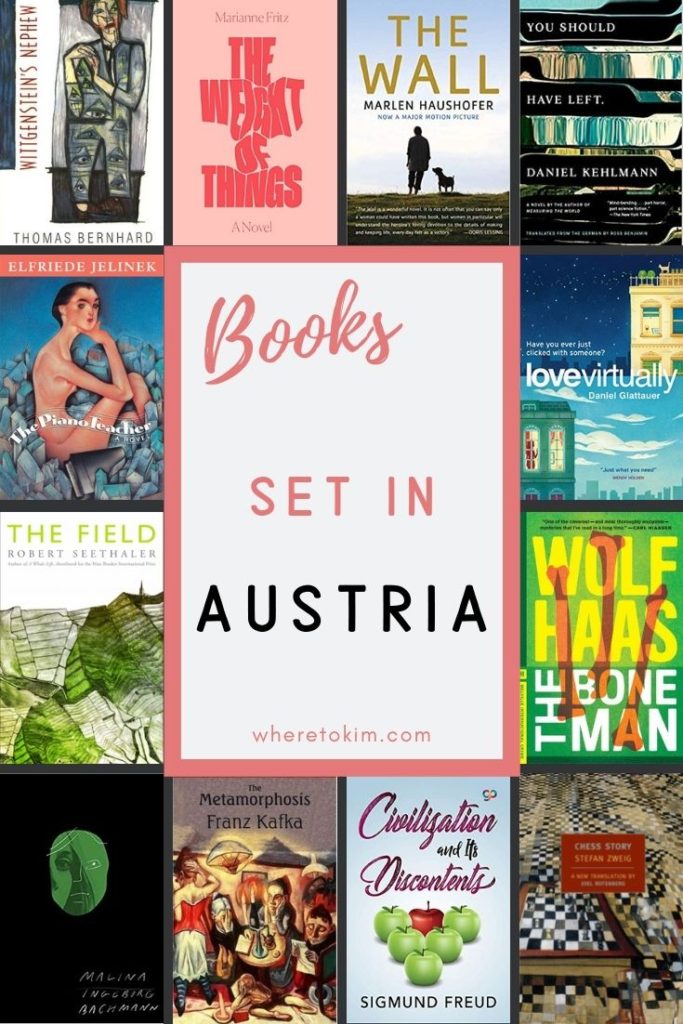What are the most interesting Austrian books? Check out these books set in Austria to start immersing yourself in the culture before your visit to Austria.
When I’m planning a trip I like to read books originating from that country to start getting immersed and learn more about the culture. If you feel the same then look at the list below for inspiration.
For this list I’ll limit myself to books with English translations and I will only rate what I have read myself. So this list will be updated regularly when I come across interesting reads. I have added an overview of other books by Austrian authors that I still want to read.
I’ll focus on more recent works and will only mention one or two works of well-known writers such as Stefan Zweig, Franz Kafka, Thomas Bernhard, Viktor Frankl and Sigmund Freud. Many great writers were born in Austria(-Hungary), did you know?
If you have read any good books set in Austria or by an author from Austria, please recommend them to me in the comment section below.
Best Austrian Books
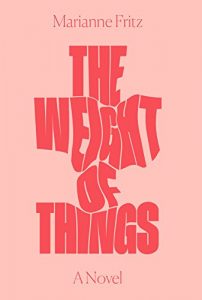
Marianne Fritz - The Weight of Things
I admire the structure of this story. Rarely have I been so subtly led to understanding the plot.
This rediscovered modernist classic tells the story of a young woman who, while still traumatized by the Second World War, struggles to resign herself to domesticity and motherhood. Slowly consumed by a weight of circumstances beyond her control, Berta endures the deep hypocrisies and the abiding cruelty of everyday life, behind which bloody tragedy threatens to break free.
The Weight of Things was Fritz’s debut novel and the first of her books to be translated into English. It won her tremendous acclaim and was awarded the Robert Walser Prize in 1978. Fritz subsequently embarked on a brilliant and ambitious literary project called The Fortress, which earned her cult status, comparisons to James Joyce, and admirers including Elfriede Jelinek and W. G. Sebald.
Buy from Amazon
Check out the free online pictures of her epic and stylish (untranslated) work Naturgemäß III.
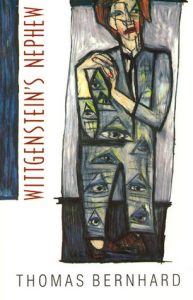
Thomas Bernhard - Wittgenstein's Nephew
What sticks with me is the irony of a narrator stuck in a hospital bed talking about how he and some other people are the happiest travelers and the unhappiest arrivals.
It is 1967. In separate wings of a Viennese hospital, two men lie bedridden. The narrator, Thomas Bernhard, is stricken with a lung ailment; his friend Paul, nephew of the celebrated philosopher Ludwig Wittgenstein, is suffering from one of his periodic bouts of madness. As their once-casual friendship quickens, these two eccentric men begin to discover in each other a possible antidote to their feelings of hopelessness and mortality — a spiritual symmetry forged by their shared passion for music, a strange sense of humor, disgust for bourgeois Vienna, and fear in the face of death. Part memoir, part fiction, Wittgenstein’s Nephew is both a meditation on the artist’s struggle to maintain a solid foothold in a world gone incomprehensibly askew, and an eulogy to a real-life friendship.
Buy from Amazon
Check out other great works by Thomas Bernhard
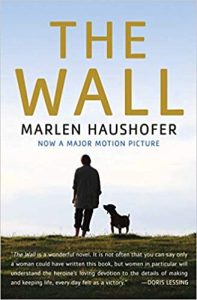
Marlen Haushofer - The Wall
Back to the basics: a woman and some animals in survival mode. At first, this sounds like a pleasant change, but trouble lurks. You would have liked to be kept ignorant until the very end…
“I can allow myself to write the truth; all the people for whom I have lied throughout my life are dead…” writes the heroine of Marlen Haushofer’s The Wall, a quite ordinary, unnamed middle-aged woman who awakens to find she is the last living human being. Surmising her solitude is the result of a too successful military experiment, she begins the terrifying work of not only survival, but self-renewal. The Wall is at once a simple and moving talk — of potatoes and beans, of hoping for a calf, of counting matches, of forgetting the taste of sugar and the use of one’s name — and a disturbing meditation on 20th century history.
Buy from Amazon
Other interesting translated works: Nowhere Ending Sky and The Loft
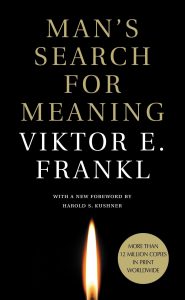
Viktor E. Frankl - Man's Search for Meaning
The most interesting thing about this book is the tone he uses to describe his time in the concentration camps.
Viktor Frankl’s riveting account of his time in the Nazi concentration camps, and his insightful exploration of the human will to find meaning in spite of the worst adversity, has offered solace and guidance to generations of readers since it was first published in 1946. At the heart of Frankl’s theory of logotherapy (from the Greek word for “meaning”) is a conviction that the primary human drive is not pleasure, as Freud maintained, but rather the discovery and pursuit of what the individual finds meaningful. Today, as new generations face new challenges and an ever more complex and uncertain world, Frankl’s classic work continues to inspire us all to find significance in the very act of living, in spite of all obstacles.
Buy from Amazon
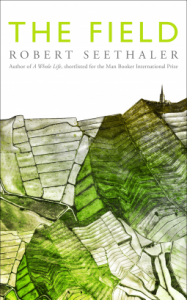
Robert Seethaler - The Field
A story full of emotion and nonchalance, carefully balancing the line between the before and after.
If the dead could speak, what would they say to the living?
From their graves in the field, the oldest part of Paulstadt’s cemetery, the town’s late inhabitants tell stories from their lives. Some recall just a moment, perhaps the one in which they left this world, perhaps the one that they now realize shaped their life forever. Some remember all the people they’ve been with, or the only person they ever loved.
These voices together – young, old, rich poor – build a picture of a community, as viewed from below ground instead of from above. The streets of the small, sleepy provincial town of Paulstadt are given shape and meaning by those who lived, loved, worked, mourned and died there.
Buy from Amazon
Read my review of The Field
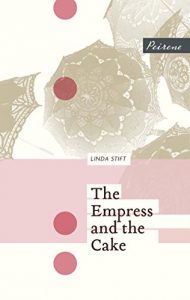
Linda Stift - The Empress and the Cake
Psychological thriller. Beware that it talks about eating disorders and contains a wide range of vomiting scenes.
Madness lurks behind the pretty façade of everyday life.
An elderly lady offers a young woman a piece of cake. She accepts. The lady resembles the Austrian Empress Elisabeth and lives with her servant in an apartment full of bizarre souvenirs. More invitations follow. A seemingly harmless visit to the museum turns into a meticulously planned raid to steal a royal cocaine syringe. Without realizing, the young woman has become the lady’s accomplice. Does she realize she is losing control?
Buy from Amazon

Daniel Glattauer - Love Virtually
The style of the book (100% emails) and the tone of the emails were not my cup of tea.
It’s a virtual romance that begins by chance. When Leo mistakenly receives e-mails from a stranger named Emmi, he replies–and Emmi writes back. Soon, secrets are shared, sparks fly, and erotic tension simmers. Even though Emmi is married, it seems only a matter of time till they meet. But will their feelings survive a real-life encounter? And, if so-what then? Funny and fast-paced, Love Virtually offers plenty of twists, turns, and satisfaction.
Buy from Amazon
The sequel Every Seventh Wave has also been translated to English
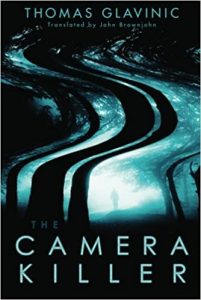
Thomas Glavinic - The Camera Killer
A rather boring account of people following the news with an unsurprising ending. I included it here so you know you can skip it.
On Good Friday, a brutal double murder takes place in the woods, and the killer records the sickening crime on videotape. With the local media building up excitement — and outrage — at the scheduled airing of the footage, two couples in the midst of celebrating the Easter holiday find their idyll interrupted by the breaking news.
Against the backdrop of twenty-four-hour news coverage, the four friends spend the weekend playing cards, chatting, eating, and drinking. Despite their best efforts to enjoy this rare time together, they’re unable to stop talking about the murders and the search for the elusive killer. Repulsed by the airing of the crime, they question the ethics of showing such atrocities on television — yet they can’t stop watching.
Buy from Amazon
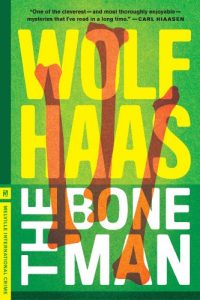
Wolf Haas - The Bone Man (Brenner #2)
I did not enjoy this book, but that is probably because the humor was lost in translation (or so they say…).
At a wildly popular chicken shack in the Austrian countryside, where snooty Viennese gourmands go to indulge their secret passion for fried chicken, a gruesome discovery is made in the pile of chicken bones waiting to be fed into the basement grinder: human bones.
But when private eye Simon Brenner shows up to investigate, the manager of the restaurant, who hired him, has disappeared … while the owner of the place urges him to stay on and eat chicken.
Brenner likes chicken, so he stays, but as he waits for the manager, he discovers that the bucolic countryside is full of suspicious types: prostitutes, war profiteers, unsavory art dealers, Slavic soccer champs with dubious pasts — and at least one rather grisly murderer. And the more Brenner looks into things, the more it dawns on him that there’s a cleaver somewhere with his name on it.
Buy from Amazon
Resurrection (Brenner #1) has also been translated, but the reviews aren’t that great.
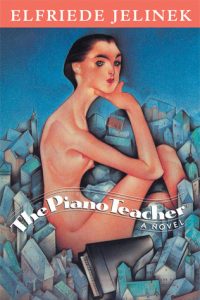
Elfriede Jelinek - The Piano Teacher
Erika Kohut is a piano teacher at the prestigious and formal Vienna Conservatory, who still lives with her domineering and possessive mother. Her life appears to be a seamless tissue of boredom, but Erika, a quiet thirty-eight-year-old, secretly visits Turkish peep shows at night to watch live sex shows and sadomasochistic films. Meanwhile, a handsome, self-absorbed, seventeen-year-old student has become enamored with Erika and sets out to seduce her. She resists him at first, but then the dark passions roiling under the piano teacher’s subdued exterior explode in a release of sexual perversity, suppressed violence, and human degradation.
Buy from Amazon
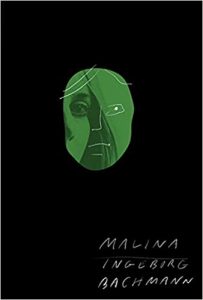
Ingeborg Bachmann - Malina
Bachmann tells the story of lives painfully intertwined: the unnamed narrator, haunted by nightmarish memories of her father, lives with the androgynous Malina, an initially remote and dispassionate man who ultimately becomes an ominous influence. Plunging toward its riveting finale, Malina brutally lays bare the struggle for love and the limits of discourse between women and men.
Buy from Amazon
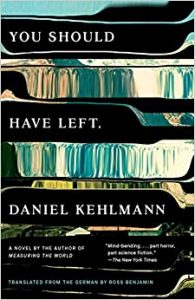
Daniel Kehlmann - You Should Have Left
A screenwriter, his wife, and their four-year old daughter rent a house in the mountains of Germany, but something isn’t right. As he toils on a sequel to his most successful movie, the screenwriter notices that rooms aren’t where he remembers them—and finds in his notebook words that are not his own.
Buy from Amazon
Another well-known book by Daniel Kehlmann is Measuring the World
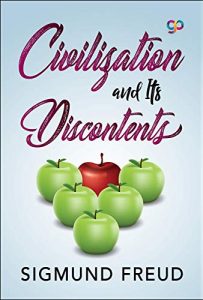
Sigmund Freud - Civilization and Its Discontents
Civilization and Its Discontents is one of the last of Freud’s books, written in the decade before his death and first published in German in 1929. It is considered his most brilliant work. In it he states his views on the broad question of man’s place in the world. It seeks to answer several questions fundamental to human society and its organization: What influences led to the creation of civilization? Why and how did it come to be? What determines civilization’s trajectory? Freud’s theories on the effect of the knowledge of death on human existence and the birth of art are central to his work.
Many of humankind’s primitive instincts (for example, the desire to kill and the insatiable craving for sexual gratification) are clearly harmful to the well-being of a human community. As a result, civilization creates laws that prohibit killing, rape, and adultery, and it implements severe punishments if such commandments are broken. This process, argues Freud, is an inherent quality of civilization that instills perpetual feelings of discontent in its citizens. Freud’s theme is that what works for civilization doesn’t necessarily work for man. Man, by nature aggressive and egotistical, seeks self-satisfaction.
Buy from Amazon
Check out other works by Sigmund Freud
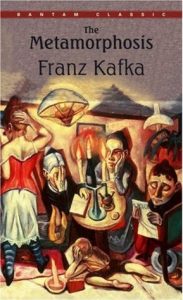
Franz Kafka - The Metamorphosis
“As Gregor Samsa awoke one morning from uneasy dreams he found himself transformed in his bed into a gigantic insect. He was laying on his hard, as it were armor-plated, back and when he lifted his head a little he could see his domelike brown belly divided into stiff arched segments on top of which the bed quilt could hardly keep in position and was about to slide off completely. His numerous legs, which were pitifully thin compared to the rest of his bulk, waved helplessly before his eyes.”
With it’s startling, bizarre, yet surprisingly funny first opening, Kafka begins his masterpiece, The Metamorphosis. It is the story of a young man who, transformed overnight into a giant beetle-like insect, becomes an object of disgrace to his family, an outsider in his own home, a quintessentially alienated man. A harrowing—though absurdly comic—meditation on human feelings of inadequacy, guilt, and isolation, The Metamorphosis has taken its place as one of the most widely read and influential works of twentieth-century fiction.
Buy from Amazon
Check out other works by Franz Kafka
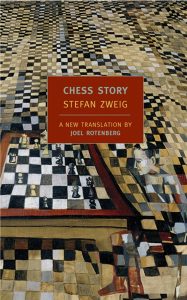
Stefan Zweig - Chess Story
Chess Story, also known as The Royal Game, is the Austrian master Stefan Zweig’s final achievement, completed in Brazilian exile and sent off to his American publisher only days before his suicide in 1942. It is the only story in which Zweig looks at Nazism, and he does so with characteristic emphasis on the psychological.
Travelers by ship from New York to Buenos Aires find that on board with them is the world champion of chess, an arrogant and unfriendly man. They come together to try their skills against him and are soundly defeated. Then a mysterious passenger steps forward to advise them and their fortunes change. How he came to possess his extraordinary grasp of the game of chess and at what cost lie at the heart of Zweig’s story.
Buy from Amazon
Check out other works by Stefan Zweig
